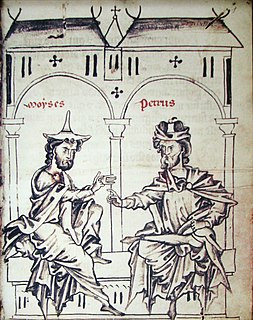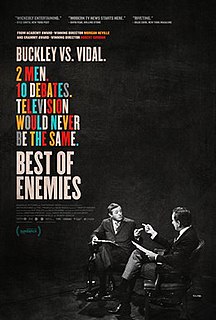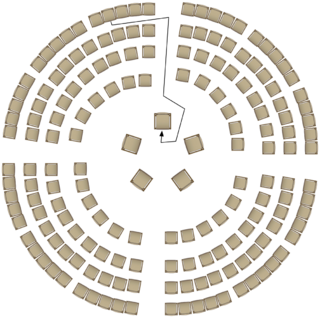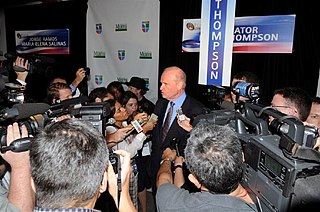 W
WDebate is a process that involves formal discourse on a particular topic, often including a moderator and audience. In a debate, arguments are put forward for often opposing viewpoints. Debates have historically occurred in public meetings, academic institutions, debate halls, coffeehouses, competitions, and legislative assemblies. Debate has also been conducted for educational and recreational purposes, usually associated with educational establishments and debating societies. These debates put an emphasis upon logical consistency, factual accuracy, and some emotional appeal to an audience. Modern forms of competitive debate also include rules for participants to discuss and decide upon the framework of the debate.
 W
WDyab Abou Jahjah is an Arab political activist and writer who was active in Europe between 2001 and 2007. He is the founder and former leader of the Arab European League (AEL), a Pan-Arabist movement that supports the interests of Muslim immigrants in Europe. Since then, Abou Jahjah has distanced himself from identity politics and holds a non-ethnic, secular, and leftist framework.
 W
WArgumentation and Advocacy is a quarterly peer-reviewed academic journal published by Taylor & Francis, edited by Beth Innocenti of University of Kansas. The journal was previously edited by Katherine Langford, Harry Weger, Catherine H. Palczewski, and John Fritch.
 W
WArgumentation theory, or argumentation, is the interdisciplinary study of how conclusions can be reached from premises through logical reasoning. It includes the arts and sciences of civil debate, dialogue, conversation, and persuasion. It studies rules of inference, logic, and procedural rules in both artificial and real world settings.
 W
WA balloon debate is a debate in which a number of speakers attempt to win the approval of an audience. The audience is invited to imagine that the speakers are flying in a hot-air balloon which is sinking and that someone must be thrown out if everyone is not to die.
 W
WBest of Enemies is a 2015 American documentary film co-directed by Robert Gordon and Morgan Neville about the televised debates between intellectuals Gore Vidal and William F. Buckley Jr. during the 1968 United States presidential election. The film premiered at the 2015 Sundance Film Festival. It was acquired by Magnolia and Participant Media.
 W
WDiscourse is a generalization of the notion of a conversation to any form of communication. Discourse is a major topic in social theory, with work spanning fields such as sociology, anthropology, continental philosophy, and discourse analysis. Following pioneering work by Michel Foucault, these fields view discourse as a system of thought, knowledge, or communication that constructs our experience of the world. Since control of discourse amounts to control of how the world is perceived, social theory often studies discourse as a window into power. Within theoretical linguistics, discourse is understood more narrowly as linguistic information exchange and was one of the major motivations for the framework of dynamic semantics, in which expressions' denotations are equated with their ability to update a discourse context.
 W
WA discussion moderator or debate moderator is a person whose role is to act as a neutral participant in a debate or discussion, holds participants to time limits and tries to keep them from straying off the topic of the questions being raised in the debate. Sometimes moderators may ask questions intended to allow the debate participants to fully develop their argument in order to ensure the debate moves at pace.
 W
WA fishbowl conversation is a form of dialog that can be used when discussing topics within large groups. Fishbowl conversations are sometimes also used in participatory events such as unconferences. The advantage of fishbowl is that it allows the entire group to participate in a conversation. Several people can join the discussion.
 W
WThe Great Debaters is a 2007 American biographical drama film directed by and starring Denzel Washington. It is based on an article written about the Wiley College debate team by Tony Scherman for the spring 1997 issue of American Legacy.
 W
WIntelligence Squared, written as Intelligence2 and also known as IQ2, is a media company that organises live debates and other cultural events around the world. It was founded in 2002 in London, where its head office is based, and it now also operates in the US, Australia, and Hong Kong. The debates, sometimes called IQ2 debates, are held in the traditional Oxford style, with as many as 2,500 people attending some events. It produces video and podcast versions of them on a regular basis on YouTube and other platforms.
 W
WJugend debattiert international is a German-language debating competition for students based on the national German pupils' contest Jugend debattiert. It is held in ten countries of Central and Eastern Europe: Estonia, Latvia, Lithuania, Poland, Russia, Slovakia, Slovenia, Czech Republic, Ukraine and Hungary. The project is funded by the Goethe-Institut, the Foundation "Remembrance, Responsibility and Future", the Hertie Foundation and the Central Agency for German Schools Abroad. There are local supporters in three countries: In Czech Republic, the project is supported by the Czech-German Future Fund, in Lithuania, by the Lithuanian Information and Technology Center for students. In Poland, Jugend debattiert international is supported by the Foundation for Polish-German Cooperation.
 W
WListen to Me is a 1989 American drama film written and directed by Douglas Day Stewart. Released on May 5, 1989, it stars Kirk Cameron, Jami Gertz, and Roy Scheider. The film was largely shot on location in Malibu, California, including the campus of Pepperdine University.
 W
WThe Long Table is an "experimental open public forum that is a hybrid performance-installation-roundtable-discussion-dinner-party designed to facilitate dialogue through the gathering together of people with common interests" developed by the artist and academic Lois Weaver. The Long Table is part of Weaver's Public Address Systems project, under the strand "Strategies for Engaging the Public Through the Everyday".
 W
WThe Open Communication Universities Debating Network was founded in 1997 in Belgrade. Founded by both professors and students, it was established as an organization which promotes civic discourse, non-violent communication, critical thinking, argumentative presentation of ideas, public speaking as a form of free speech and the use of parliamentary debate as an educational and promotional tool.
 W
WA round table is a table which has no "head" and no "sides", and therefore no one person sitting at it is given a privileged position and all are treated as equals. The idea stems from the Arthurian legend about the Knights of the Round Table in Camelot.
 W
WA spin room, also known as spin row or spin alley, is an area in which reporters can speak with debate participants and/or their representatives after a debate. The name refers to the fact that the participants will attempt to "spin" or influence the perception of the debate among the assembled reporters. The benefit for reporters is that they quickly get in-person interviews with debaters or their representatives, complete with audio, video, and photos. For a U.S. presidential debate, the number of reporters in the spin room can number into the thousands.
 W
WThe John H. Jackson Moot Court Competition. is an international moot court competition on WTO law. The competition takes place on a yearly basis, with its first edition dating back to 2002. The competition was formerly known as ELSA Moot Court Competition on WTO but has been renamed in 2018 after the American professor of law John Howard Jackson.